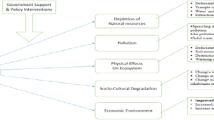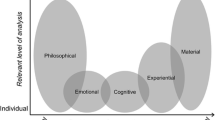Abstract
Drawing on contemporary research into ethical consumption and sustainable tourism this article starts by outlining the ways in which sustainable tourism (and other forms of ethical consumption) has been understood as a means to perform class based distinctions. At this stage, it is suggested that whilst class may be one factor in understanding such a complex phenomena there might also be a need to examine the practices of sustainable tourist in a manner that takes seriously individual attempts to ‘be ethical’. Foucault’s understanding of ethics is then offered as a means through which this can be achieved. A brief account of the method used to read individuals accounts of sustainable tourism through an ethical Foucauldian lens is then presented. Following this the paper presents the analysis of interviews with sustainable tourists focusing on two key elements. Firstly, the analysis presents the emotional and reciprocal elements of interactions between sustainable tourists and the human ‘other’. Secondly the analysis examines the relationship between the sustainable tourist and non-human environments to further develop the understanding of the emotional and reciprocal elements in light of a Foucauldian ethics. In conclusion it is suggested that rather than merely representing a mode of class distinction, sustainable tourism can be understood through an appreciation of the emotional and reciprocal relationship with the other, thus taking seriously individuals attempts to engage with ethical practices.
Similar content being viewed by others
References
Adams, M., & Raisborough, J. (2008). What can sociology say about FairTrade? Situating reflexivity in ethical consumption. Sociology, 42(6), 1165–1182.
Anderson, J. (2009). Transient convergence and relational sensibility: Beyond the modern constitution of nature. Emotions, Space and Society, 2(2), 120–127.
Arribas-Ayllon, M., & Walkerdine, V. (2008). Foucauldian Discourse Analysis. In C. Willig & W. Stainton-Rogers (Eds.), The sage handbook of qualitative research in psychology. London: Sage.
Baines, A. (1998). Technology and tourism. Work Study, 47(5), 160–163.
Banyai, A. (1973). The great outdoors. Chest, 63(5), 717.
Barnett, C., Clarke, N., Cloke, P., & Malpass, A. (2005a). The political ethics of consumerism. Consumer Policy Review, 15(2), 45–51.
Barnett, C., Cloke, P., Clarke, N., & Malpass, A. (2005b). Consuming ethics: Articulating the subjects and spaces of ethical consumption. Antipode, 37(1), 23–45.
Barr, S., Shaw, G., Coles, T., & Prillwitz, J. (2010). ‘A holiday is a holiday’: Practicing sustainability, home and away. Journal of Transport Geography, 18(3), 474–481.
Besley, T. (2005). Foucault, truth telling and technologies of the self in schools. Journal of Educational Enquiry, 6(1), 76–89.
Bourdieu, P. (1984). Distinction: A social critique of the judgement of taste. London: Routledge.
Bramwell, B., & Lane, B. (2014). The “critical turn” and its implications for sustainable tourism research. Journal of Sustainable Tourism, 22(1), 1–8.
Bray, R., & Raitz, V. (2001). Flight to the sun: The story of the holiday revolution. London: Continuum.
Burkitt, I. (2008). Subjectivity, self and everyday life in contemporary capitalism. Subjectivity, 23(1), 236–245.
Carr, A. (2004). Mountain places, cultural spaces: The interpretation of culturally significant landscapes. Journal of Sustainable Tourism, 12(5), 432–459.
Caruana, R., & Crane, A. (2008). Constructing consumer responsibility: Exploring the role of corporate communications. Organization Studies, 29(12), 1495–1519.
Clarke, N., Barnett, C., Cloke, P., & Malpass, A. (2007). The political rationalities of fair-trade consumption in the United Kingdom. Politics and Society, 35(4), 583–607.
Cohen, E., & Cohen, S. (2012). Current sociological theories and issues in tourism. Annals of Tourism Research, 39(4), 2177–2202.
Cowe, R., & Williams, S. (2001). Who are the ethical consumers? Co-operative Bank report.
Croall, J. (1995). Preserve or destroy: Tourism and the environment. London: Calouste Gulbenkian Foundation.
Danaher, G., Schirato, T., & Webb, J. (2000). Underastanding Foucault. London: Sage.
Davies, H. (1986). The grand tour. London: Hamish Hamilton.
Dinan, C., & Sargeant, A. (2000). Social marketing and sustainable tourism—Is there a Match? International Journal of Tourism Research, 2(1), 1–14.
Dolnicar, S. (2010). Identifying tourists with smaller environmental footprints. Journal of Sustainable Tourism, 18(6), 717–734.
Dolnicar, S., Crouch, G., & Long, P. (2008). Environment-friendly Tourists: What do we really know about them? Journal of Sustainable Tourism, 16(2), 197–210.
Dreyfus, H., & Rabinow, P. (1982). Michel foucault: Beyond structuralism and hermeneutics. Brighton: Harvester Books.
Ettlinger, N. (2009). Whose capitalism? Mean discourse and/or actions of the heart. Emotions, Space and Society, 2(2), 92–97.
Evans, R., & Thomas, F. (2009). Emotional interactions and an ethics of care: Caring relations in families affected by HIV and AIDS. Emotions, Space and Society, 2(2), 111–119.
Fennell, D. (2006). Tourism ethics. Clevedon: Channel View.
Fletcher, R. (2011). Sustaining tourism, sustaining capitalism? The tourism industry’s role in global capitalist expansion. Tourism Geographies: An International Journal of Tourism Space, Place and Environment, 13(3), 443–461.
Foucault, M. (1990). The care of self: The history of sexuality (Vol. 3). (R. Hurley, Trans). London: Penguin.
Foucault, M. (1991). Truth and power. In P. Rabinow (Ed.), The Foucault reader: An introduction to Foucault’s thought. London: Penguin.
Foucault, M. (1992). The use of pleasure: The history of sexuality (Vol. 2). (R. Hurley, Trans). London: Penguin.
Foucault, M. (1997a). The ethics of the concern for self as a practice of freedom. In P. Rabinow (Ed.), Michel Foucault: Ethics subjectivity and truth. Harmondsworth: Penguin.
Foucault, M. (1997b). Friendship as a way of life. In P. Rabinow (Ed.), Michel Foucault: Ethics subjectivity and truth. Harmondsworth: Penguin.
Foucault, M. (1997c). Technologies of the Self. In P. Rabinow (Ed.), Michel Foucault: Ethics subjectivity and truth. Harmondsworth: Penguin.
France, L. A. (1997). The Earthscan reader in sustainable tourism. London: Earthscan.
Goodman, D., & Goodman, M. (2001). Sustaining foods: Organic consumption and the socio-ecological imaginary. In M. J. Cohen & J. Murphy (Eds.), Exploring sustainable consumption: Environmental policy and the social sciences. Oxford: Elsevier Science.
Gunders, J. (2008). Professionalism, place, and authenticity in the Cook and the Chef. Emotions, Space and Society, 1(2), 119–126.
Habermas, J. (1990). The philosophical discourse of modernity: Twelve lectures (Lawrence, F Trans). Cambridge: MIT Press.
Hanna, P. (2009). Conceptualising sustainable tourism—ethics, inequalities and colonialism. Enquire, 2(1), 1–22.
Hanna, P. (2013). A break from ‘reality’: An investigation into the ‘experiments with subjectivity’ on offer within the promotion of sustainable tourism in the UK. Journal of Consumer Culture, 13(3), 366–386.
Heyes, C. (2007). Self-transformations: Foucault, ethics, and normalized bodies (Studies in Feminist Philosophy). Oxford: Oxford University Press.
Hibbert, C. (1987). The grand tour. London: Methuen London Ltd.
Honey, M. (1999). Ecotourism and sustainable development: Who owns paradise?. Washington: Island Press.
Hook, D. (2007). Foucault, psychology and the analytics of power. Basingstoke: Palgrave Macmillan.
Howard, M., & Willmott, M. (2001). Ethical consumption in the twenty-first century. In T. Bentley & D. Stedman-Jones (Eds.), The moral universe. London: Demos.
Hunter, C. (2002a). Aspects of the sustainable tourism debate from a natural resource perspective. In R. Harris, T. Griffin, & P. Williams (Eds.), Sustainable tourism: A global perspective. Oxford: Butterworth-Heinemann.
Hunter, C. (2002b). Sustainable tourism and the touristic ecological footprint. Environment, Development and Sustainability, 4(1), 7–20.
Infinito, J. (2003). Ethical self-formation: A look at the Later Foucault. Educational Theory, 53(2), 155–171.
Ingram, C. D., & Durst, P. B. (1989). Nature-orientated tour operators: Travel to developing countries. Journal of Travel Research, 28(2), 11–15.
Jamal, T., & Camargo, B. A. (2014). Sustainable tourism, justice and an ethic of care: Toward the Just Destination. Journal of Sustainable Tourism, 22(1), 11–30.
Koppensteiner, N. (2006). Energizing Foucault. Asteriskos, 1(2), 47–60.
Kuhn, L. (2007). Sustainable tourism as emergent discourse. World Futures, 63(3), 286–297.
Latour, B. (2004). Politics of nature. How to bring the sciences into democracy. London: Harvard University Press.
Lewis, I., Semeijn, J., & Talalayevsky, A. (1998). The impact of information technology on travel agents. Transportation Journal, 37(4), 20–25.
Lofgren, O. (1999). On holiday: A history of vacationing. California: University of California Press.
Lyon, S. (2006). Evaluating fair trade consumption: politics, defetishization and producer participation. International Journal of Consumer Studies, 30(5), 452–464.
Middleton, V. T. C., & Lickorish, L. J. (2005). British Tourism: The remarkable story of growth. Oxford: Elsevier Butterworth-Heinemann.
Miller, G., Rathouse, K., Scarles, C., Holmes, K., & Tribe, J. (2010). Public understanding of sustainable tourism. Annals of Tourism Research, 37(3), 627–645.
Mills, S. (2003). Michel Foucault (Routledge Critical Thinkers). Abingdon: Routledge.
Mowforth, M., & Munt, I. (2003). Tourism and sustainability: Development and new tourism in the third world (2nd ed.). London: Routledge.
Murtagh, M. (2008). A funny thing happened on the way to the journal: A commentary on Foucault’s ethics and Stuart Murray’s “Care of the self”. Philosophy, Ethics, and Humanities in Medicine, 3(2), 1–3.
Nicholls, A., & Opal, C. (2005). Fair Trade: Market-driven ethical consumption. London: Sage.
Nuppenau, E. (2002). Tpwards a genuine exchange value of nature: Interactions between humans and nature in a principle-agent-framework. Ecological Economics, 43(1), 33–47.
Quastel, N. (2008). Ethical consumption, consumer self-governance, and the later foucault. Dialogue, 47(1), 25–52.
Rajchman, J. (1986). Ethics after Foucault. Social Text, 13(14), 165–183.
Renard, M. (2005). Quality certification, regulation and power in fair trade. Journal of Rural Studies, 21(4), 419–431.
Rose, N. (1989). Governing the soul. London: Routledge.
Said, E. (1978). Orientalism. New York: Pantheon Books.
Shove, E. (2012). Habits and their creatures. In A. Warde & D. Southerton (Eds.), The habits of consumption (pp. 100–113). Helsinki: Helsinki Collegium for Advanced Studies.
Singh, T., Slotkin, M., & Vamosi, A. (2007). Attitude towards ecotourism and environmental advocacy: Profiling the dimensions of sustainability. Journal of Vacation Marketing, 13(2), 119–134.
Tallontire, A., Rentsendorj, E., & Blowfield, M. (2001). Ethical consumers and ethical trade: A review of current literature. Policy Series 12. Chatham, Natural Recourses Limited.
Taylor, C. (1984). Foucault on Freedom and truth. Political Theory, 12(2), 152–183.
Varul, M. (2009). Ethical selving in cultural contexts: Fairtrade consumption as an everyday ethical practice in the UK and Germany. International Journal of Consumer Studies, 33(2), 183–189.
Walton, J. K. (1983). The English seaside resort: A social history 1750–1914. Leicester: Leicester University Press.
Willig, C. (2008). Introducing qualitative research in psychology (2nd ed.). Berkshire: Open University Press.
Wright, C. (2004). Consuming lives, consuming landscapes: Interpreting advertisements for CafeDirect coffees. Journal of International Development, 16(5), 665–680.
Yates, S., & Hiles, D. (2010). Towards a ‘Critical Ontology of Ourselves’? Foucault, subjectivity and discourse analysis. Theory & Psychology, 20(1), 52–75.
Yearley, S. (1991). The Green case: A sociology of environmental issues, arguments and politics. London: HarperCollins.
Author information
Authors and Affiliations
Corresponding author
Rights and permissions
About this article
Cite this article
Hanna, P., Johnson, K., Stenner, P. et al. Foucault, sustainable tourism, and relationships with the environment (human and nonhuman). GeoJournal 80, 301–314 (2015). https://doi.org/10.1007/s10708-014-9557-7
Published:
Issue Date:
DOI: https://doi.org/10.1007/s10708-014-9557-7




